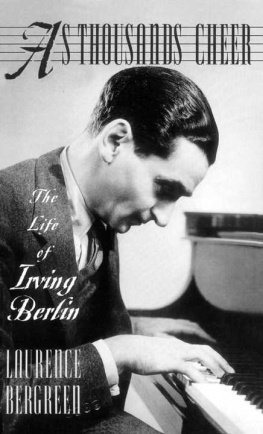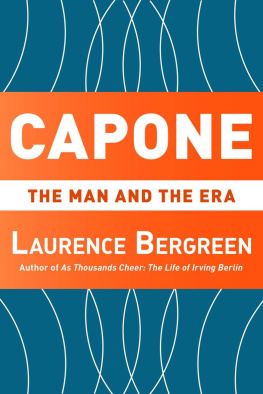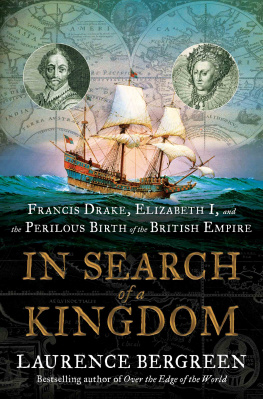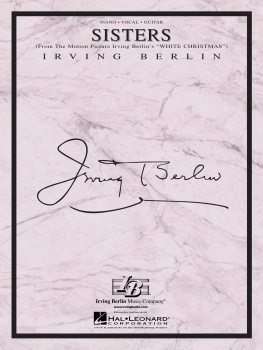Laurence Bergreen - As Thousands Cheer: The Life of Irving Berlin
Here you can read online Laurence Bergreen - As Thousands Cheer: The Life of Irving Berlin full text of the book (entire story) in english for free. Download pdf and epub, get meaning, cover and reviews about this ebook. year: 1990, publisher: Viking, genre: Non-fiction. Description of the work, (preface) as well as reviews are available. Best literature library LitArk.com created for fans of good reading and offers a wide selection of genres:
Romance novel
Science fiction
Adventure
Detective
Science
History
Home and family
Prose
Art
Politics
Computer
Non-fiction
Religion
Business
Children
Humor
Choose a favorite category and find really read worthwhile books. Enjoy immersion in the world of imagination, feel the emotions of the characters or learn something new for yourself, make an fascinating discovery.
- Book:As Thousands Cheer: The Life of Irving Berlin
- Author:
- Publisher:Viking
- Genre:
- Year:1990
- Rating:4 / 5
- Favourites:Add to favourites
- Your mark:
- 80
- 1
- 2
- 3
- 4
- 5
As Thousands Cheer: The Life of Irving Berlin: summary, description and annotation
We offer to read an annotation, description, summary or preface (depends on what the author of the book "As Thousands Cheer: The Life of Irving Berlin" wrote himself). If you haven't found the necessary information about the book — write in the comments, we will try to find it.
As Thousands Cheer: The Life of Irving Berlin — read online for free the complete book (whole text) full work
Below is the text of the book, divided by pages. System saving the place of the last page read, allows you to conveniently read the book "As Thousands Cheer: The Life of Irving Berlin" online for free, without having to search again every time where you left off. Put a bookmark, and you can go to the page where you finished reading at any time.
Font size:
Interval:
Bookmark:


by
~flUNfNCf BfNGBffN

"Bergreen's work is a major accomplishment. It will stand as the definitive biography of a man whose fathomless well of unforgettable melody and rare gift for simple, homey, touching lyrics made his songs among the best."
-Chicago Tribune
"Revealing ... Stirring ... Bergreen vividly depicts Berlin's life in its various stages-as a Tin Pan Alley tunesmith, World War I recruit, Broadway showman, and Hollywood composer."
-Parade
"What a life, and what a book!"
-The Daily Mail
"[Bergreen] does a particularly good job in recreating the entire environment of which Berlin was a part-in essence, this is a short history of American popular culture for the first half of the 20th century. Biographies of numerous show-business notables stud the pages.... An essential work."
-Choice
"A compelling interpretation."
-Smithsonian
"Authoritative and fascinating ... Because the texture of Bergreen's book is so rich, so full of details of the times surrounding Berlin's songs, it becomes a kind of show-biz history, too."
-Seattle Times
"Bergreen's book contains some fascinating minor curiosities and digs deeply into explaining Berlin the man."
Spectator
"A compelling biography ... As Thousands Cheer presents a vivid portrait of the man and his era."
-Cleveland Plain Dealer
"A painstaking, professional, and ultimately satisfying biography."
-Los Angeles Times Book Review

To Betsy, Nick, and Sara

During the final decades of his life, Irving Berlin was preoccupied with preserving his privacy. His obsession meant he would not authorize his biography, nor would he cooperate with anyone writing an article about him-let alone a book. He often said that he wanted no account of his life to appear until after he died. True to form, he declined to speak directly with me, despite numerous requests that I made over a period of several years.
Now, after his death on September 22, 1989, at the age of 101, the time has come to tell the story of the greatest songwriter in our nation's history-Irving Berlin.
In the course of my research for this biography, I was fortunate to encounter a number of people who are knowledgeable on the subject of popular music in general and Irving Berlin in particular. I wish to single out for special mention Miles Kreuger, the president of the Institute of the American Musical in Los Angeles, and James T. Maher, a historian and editor of American Popular Song. Their assistance has been crucial to this book.
My literary agent, Wendy Weil, has been remarkably sensitive and supportive ever since the beginning of this project. I am grateful for her expertise in negotiating all aspects of publishing this work and for her friendship and understanding.
At Viking Penguin, I had the good fortune to work with Amanda Vaill. The manuscript has benefited from her scrupulous editorial attention, and I have delighted in her wit, her professionalism, and her unquenchable enthusiasm.
I conducted approximately two hundred interviews for this book, the vast majority of them held face-to-face. I would like to thank the following individuals for generously sharing their reminiscences: George Abbott, Eddie Albert, Alan Anderson, Ernest Anderson, Edward A. Berlin, Jay Blackton, Joan Bennett, Pandro S. Berman, Al Brackman, Oscar Brand, Carol Bruce, Irving Caesar, Sammy Cahn, Saul Chaplin, Don Chandler, Goldie Clough, Mynna Granat Dreyer, Jack Elliott, Nanette Fabray, Leonard Feist, the late John Green, Stanley Green, Evelyn Haynes, Mary Healey, Jack Hirshberg, William C. K. Irwin, Ed Jablonski, E. J. Kahn, Helmy Kresa, Miles Kreuger, Maurice Kusell, Burton Lane, the late T. Newman Lawler, Harold Leventhal, Dorothy Lindsay, Robert Lissauer, Kathleen Lombard, William Mackay, James T. Maher, Alan Manson, Gerald Marks, Allyn Ann McLerie, Ward Morehouse, Russell Nype, Hermes Pan, Ezio Peterson, Thomas Pryor, Milton Rosenstock, Nick Savano, Sidney Sheldon, Arthur Shimkin, Al Simon, Gary Stevens, Ezra Stone, JoAnn Young, Magda Volges, Walter Wager, John Wallowitch, Ian Whitcomb, Gil Wiest, and David L. Wolper.
I interviewed a number of other individuals who talked about Irving Berlin on an anonymous basis, and they, too, have my thanks.
Librarians and archivists around the country helped me to locate documents that shed light on Berlin, his collaborators, and his times. Ned Comstock of the Archives of Performing Arts at the University of Southern California gave me access to the Warner Brothers and Arthur Freed Collections. Thanks also to Sam Gill of the Margaret Herrick Library of the Academy of Motion Picture Arts and Sciences in Beverly Hills and to Leith Adams of USC.
In New York City, the Performing Arts Research Center of the New York Public Library proved to be an essential resource. At the Shubert Archive, Maryann Chach guided me toward valuable documents. Faith Coleman aided my research at the Museum of the City of New York. At the Library of the Association of the Bar of the City of New York, curator Anthony P. Grech expedited my work. At ASCAP, Mike Kerker proved helpful. Stephen Siegel of the 92nd Street Y, Zachary Baker of the YIVO Institute for Jewish Research, and Michelle Anish of the Blaustein Library of the American Jewish Committee all assisted my research into Berlin's Russian origins. At the New York Society Library, I was able to locate a number of long-forgotten theater memoirs. The resources of the New-York Historical Society and the New York Sheet Music Society also proved useful.
At the Museum of Modern Art, I screened a number of films with scores by Berlin. The museum's Film Stills Archive, under the direction of Mary Corliss, supplied photographs. My thanks to James Snyder, friend of many years, for expediting my research at MOMA.
Much of my inquiry into the history of the Mackay family was conducted at the Bryant Library in Roslyn, Long Island, where archivist Anthony Cucchiara brought the Clarence H. Mackay papers to my attention, as well as numerous photographs of the family.
Acknowledgment as well goes to Jennie Rathbun and Rodney Dennis of the Houghton Library of Harvard University, for granting me access to the papers of Alexander Woollcott; Dr. John Gable, executive director of the Theodore Roosevelt Association; the Motion Picture Division of the Library of Congress; Emmett D. Chisum of the University of Wyoming at Laramie; the Smithsonian Institution for supplying a photograph of Berlin's transposing piano; the Manuscript Division of the Library of Congress; the State Historical Society of Wisconsin in Madison; and the Peabody Museum of Salem, Massachusetts, for providing a photograph of the ship that brought a young immigrant named Israel Baline to the New World. I also wish to acknowledge my debt to Gerald Bordman's masterful chronicle of the Broadway stage, American Musical Theatre.
Font size:
Interval:
Bookmark:
Similar books «As Thousands Cheer: The Life of Irving Berlin»
Look at similar books to As Thousands Cheer: The Life of Irving Berlin. We have selected literature similar in name and meaning in the hope of providing readers with more options to find new, interesting, not yet read works.
Discussion, reviews of the book As Thousands Cheer: The Life of Irving Berlin and just readers' own opinions. Leave your comments, write what you think about the work, its meaning or the main characters. Specify what exactly you liked and what you didn't like, and why you think so.







